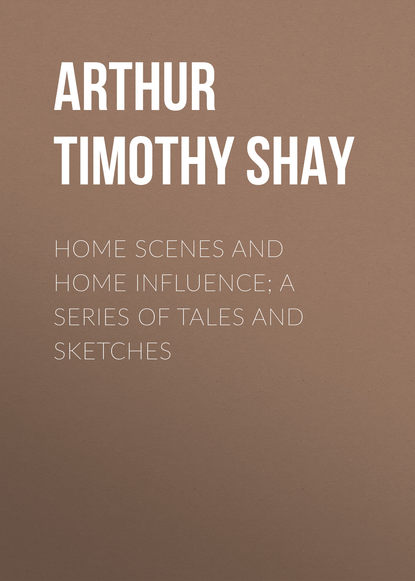По всем вопросам обращайтесь на: info@litportal.ru
(©) 2003-2025.
✖
Home Scenes and Home Influence; a series of tales and sketches
Настройки чтения
Размер шрифта
Высота строк
Поля
"To-day?"
Anna's face became troubled.
"No, not until the day after to-morrow."
The young wife's countenance lighted up again.
"Is that all?"
"Yes, thank Heaven, that is all. But how the payment is to be made, is more than I can tell."
Dinner was now announced.
"I shall have to turn financier again," said Anna, smiling, as she drew her arm within that of her husband, and led him away to the dining-room.
"I'm a little afraid of your financiering," returned her husband, shaking his head. "You might sell me next as a useless piece of furniture."
"Now, George, that is too bad," replied Anna, looking hurt.
"I only jested, dear," said Brainard, repairing the little wrong done to her feelings with a kiss. "Your past efforts at financiering were admirable, and I only hope your next attempt may be as successful."
Two days more passed, during which time neither Brainard nor his wife said any thing to each other about money, although the thoughts of both were busy for most of the time on that interesting subject. Silently sat Brainard at the breakfast-table on the morning of the day when his last note fell due. How was he to meet the payment? Two hundred dollars! He had not so much as fifty dollars in his possession, and as to borrowing, that was a vain hope. Must he go to the holder of the note, and ask a renewal? He shrunk from the thought, murmuring to himself—"Any thing but that."
As for getting the required sum through Anna, he did not permit himself to hope very strongly. She had looked thoughtful since their last interview on the subject, and at times, it seemed to him, troubled. It was plain that she had been disappointed in any efforts to get money that she might have made.
"That she, too, should be subject to mortification and painful humiliation!" said he, as his mind dwelt on the subject. "It is too bad—too bad!—Oh, to think that my folly should have had this reaction!"
Anna looked sober as Brainard parted with her after breakfast, and he thought he saw tears in her eyes. As soon as he was gone she dressed herself, and taking from a handsome jewel-box the present of her husband, a gold watch and chain, a bracelet, diamond pin, and some other articles of the same kind, left the house.
Two hours afterward, as Brainard sat at his desk trying to fix his mind upon the accounts before him, a note was handed in bearing his address. He broke the seal, and found that it enclosed one hundred and seventy dollars, with these few words from Anna:
"This is the best I can do for you, dear husband. Will it be enough?"
"God bless her!" came half audibly from the lips of Brainard, as he drew forth his pocket-book, in which were thirty dollars. "Yes, it will be enough."
"There is no comfort in owing, or in paying after this fashion," said the young man to himself, as he walked homeward at dinner-time, with his last note in his pocket. "There will have to be a change."
And there was a change. When next I visited my young friend, I found him in a smaller house, looking as comfortable and happy as I could have wished to see him. We talked pleasantly about the errors of the past, and the trouble which had followed as a natural result.
"There is one thing," said Brainard, during the conversation, glancing at his wife as he spoke, "that I have not been able to make out."
"What is that?" asked Mrs. Brainard, smiling.
"Where the last one hundred and seventy dollars you gave me came from."
"Have you missed nothing?" said she, archly.
"Nothing," was his reply.
"Been deprived of no comfort?"
"So far from it, I have found a great many new ones."
"And been saved the trouble of winding up and regulating that pretty eight-day clock for which you gave forty dollars."
Brainard fairly started to his feet as he turned to the mantel, and, strange to say, missed, for the first time, the handsome timepiece referred to by his wife.
"Why, Anna, is it possible? Surely that hasn't been gone for two months!"
"Oh, yes, it has."
"Well, that beats all."
And Brainard resumed his chair.
"You've been just as comfortable," said the excellent young woman.
"But you didn't get a hundred and seventy dollars for the timepiece?"
"No. Have you lost no other comfort? Think."
Brainard thought, but in vain. Anna glided from the room, and returned in a few moments with her jewel-box.
"Do you miss any thing?" said she, as she raised the lid and placed the box in his hands.
"Your watch and chain!"
Anna smiled.
"You did not sell them?"
"Yes."
"Why, Anna! Did you set no value on your husband's gifts?"
There was a slight rebuke in the tone of Brainard. Tears sprang to Anna's eyes, as she answered—"I valued them less than his happiness."
Brainard looked at her for a few moments with an expression of deep tenderness. Then turning to me, he said, in a voice that was unsteady from emotion—"You shall be my judge. Has she done wrong or right?"
"Right!" I responded, warmly. "Right! thank Heaven, my friend, for giving you a true woman for a wife. There is some hope now of your finding the comfort you sought so vainly in the beginning."
And he has found it—found it in a wise appropriation, of the good gifts of Providence according to his means.
CHILDREN—A FAMILY SCENE
"MOTHER!"
"As I was saying"—











